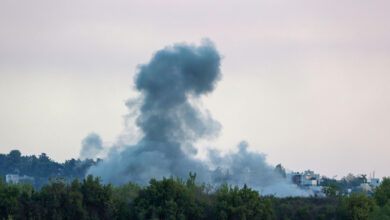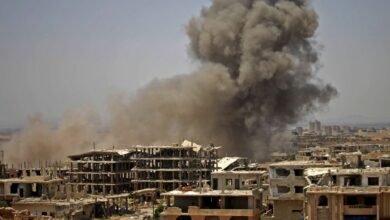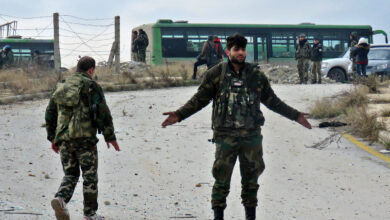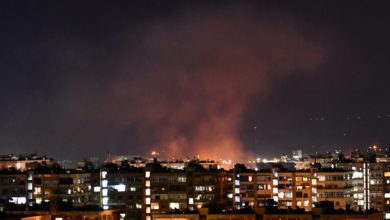OPCW investigates alleged banned weapons use in northern Syria
SDF called for investigation into use of 'unconventional weapons' after reports of children being treated for severe burns
The Organization for the Prohibition of Chemical Weapons is investigating allegations that prohibited weapons have been used during the Turkey-led incursion into northern Syria.
Syrian rebels backed by Turkish special forces, artillery and airstrikes invaded northern Syria last week to fight the Syrian Democratic Forces, the multi-ethnic alliance of militias formed to fight Islamic State with the support of the U.S.-led international Coalition against ISIS.
“The OPCW is aware of the situation in northern Syria and is collecting information at OPCW Headquarters with regard to the alleged use of chemical weapons,” a spokesperson for the organization told Newsweek on Friday, October 18.
“So far, the OPCW has not yet determined the credibility of these allegations.”
News of the OPCW investigation came after SDF media chief Mustafa Bali on Thursday posted video of a child with severe burns on his face and body.
“We suspect that unconventional weapons are used against SDF fighters upon the reports and and signs we received from the besieged towns,” Bali wrote on Twitter.
“We urge international organizations to send their teams to investigate some wounds sustained in attacks. The medical facilities in NE Syria lack expert teams following withdrawal of NGO’s due to Turkish invasion attacks.”
Accusations of white phosphorus use
Bali’s accusations came after the SDF-aligned AHNA news agency on Wednesday, Foreign Policy on Thursday, and The Times of London on Friday reported children were being treated for severe abnormal burns.
The Times report said the “terrible wounds” suggest Turkey “is using white phosphorus against Kurdish civilians,” while ANHA accused Turkey of using “internationally prohibited phosphorus.”
The military use of white phosphorus is not banned, even though it can cause severe burns that can penetrate to the bone. It is typically employed to produce smoke to obscure battlefield positions, but can also be used as an offensive incendiary weapon.
The use of incendiary weapons is controlled by Protocol III of the United Nations Convention on Certain Conventional Weapons, which came into force in 1983. Under the protocol, certain munitions, including smoke shells that only have a secondary incendiary effect, are not considered incendiary weapons.
However, using incendiary weapons against civilians, or air-dropping them against military targets in areas containing a civilian population, are both explicitly forbidden by Protocol III.
Turkey is one of nine of the 125 states that have ratified or acceded to the treaty that are not signatories to Protocol III.
The United States has deployed white phosphorus in Fallujah, Iraq, in 2004, and used it against targets during the Vietnam war. The U.S. military also uses white phosphorus to destroy weapons and sensitive electronic equipment to prevent them from falling into the hands of other forces during hasty withdrawals.
Civilians bear brunt of northeast Syria fighting
U.S. Vice President Mike Pence announced Thursday that Turkey had agreed to a 120-hour temporary ceasefire in northeast Syria.
SDF commander General Mazlum Abdi later said the force agreed to a ceasefire on the Ras al-Ayn (Serekaniye) and Tal Abyad fronts, where Turkey has focused its ground attack. Abdi said that his side would not accept Turkey’s proposed transfer of millions of Syrian refugees, mostly Arabs, into Kurdish-majority areas of northern Syria.
European Union Council President Donald Tusk on Friday reiterated a call for prospective E.U. member Turkey to immediately halt its military operation in northern Syria, describing the “so-called ceasefire” as “a demand of capitulation of the Kurds.”
The SDF’s political arm the Syrian Democratic Council called on the United Nations, the Arab League and the United States to send international observers to “maintain the temporary ceasefire.”
A day earlier, the SDC called for a humanitarian corridor to evacuate the border town of Ras al-Ayn. More than 200 people have died since Turkey’s operation began on October 9, according to the health authority in northeast Syria, and the United Nations Refugee Agency (UNHCR) estimates at least 160,000 people have been displaced, but the actual number may be much higher.
Also on Friday, the chairs of the foreign affairs committees of the European, French, German, and United Kingdom parliaments and the U.S. House of Representatives condemned the Turkish operation as a “military aggression and a violation of international law.”












